Labs/Centers

In the SDM Research Institute, professors, students, as well as internal and external researchers establish laboratories (or centers) to conduct research. There are two types of research laboratories: Faculty-specific and Trans-domain. Each supervising professor leads a faculty-specific laboratory, while Trans-domain laboratories are shared by several professors from different domains engaged in similar research themes.
For further information on the activities and members of each laboratory (center) please open the following link.
Business Engineering Research Laboratory
 http://lab.sdm.keio.ac.jp/nakanolab/en/
http://lab.sdm.keio.ac.jp/nakanolab/en/
Research topics
(1) System design for environment
(2) Enterprise integration and supply network
(3) Enterprise risk management
(4) Marketing and value chain analysis
(5) Management of technology development
(6) Business process reengineering
Communication Design Laboratory
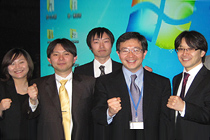 http://lab.sdm.keio.ac.jp/tomalab/home.html (Japanese only)
http://lab.sdm.keio.ac.jp/tomalab/home.html (Japanese only)
Research on real-time and real-size communication by Fiber-to-the Display technologies, which connect a plastic optical fiber to a large size display.
Comparative Political Systems Laboratory
Systems theory can be defined as the study of "a collection of multiple elements that work together". The aim of such study concerns the discovery of principles which determine/predict the outcomes, interactions, and behaviour of systems across various fields of human endeavour. The new institutionalism of political science is very much in theoretical approach and ideational scope a close relative of systems theory. The new institutionalism in political science posits that certain rules, structures, and organizations (both formal and informal) impact the behaviour of political actors and shape political outcomes. Institutionalists appreciate the inter-dynamics, hierarchy, and nested nature of institutions. This echoes systems theory in its attention to interactions between systems, the existence of subsystems, and the distinction between closed and open systems.
The holy grail of comparative institutional study has been in uncovering robust enough generalizations of various institutions so as to be able to propose real-world political engineering. The comparative institutionalist approach therefore parallels the aims of systems design and management as pursued at SDM.
The "comparative political systems" laboratory aims to study and refine the overlapping areas of methodology and practice between systems theory and comparative institutionalism in political science. In this lab, we consider past experiences of political engineering, particularly in the area of local government systems, through the perspective of system design and management.
Control Systems Design and Dynamics Laboratory
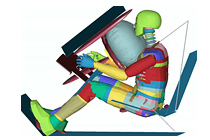 http://lab.sdm.keio.ac.jp/nismlab/ (Japanese only)
http://lab.sdm.keio.ac.jp/nismlab/ (Japanese only)
Safety Control Systems Design
(1) Seismic response control utilizing ICT such as real-time earthquake information
-Application to building-like structure or cranes
(2) Mobility safety control
- Occupant protection control
- Adaptive cruise control using ITS-based information
(3) Model-driven systems design
- Application of SysML to develop small satellites
Human System Design Laboratory
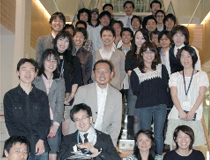 http://lab.sdm.keio.ac.jp/maenolab/index.htm
http://lab.sdm.keio.ac.jp/maenolab/index.htm
Our goal is to understand and develop systems in relation to human beings. On the one hand, we analyze humans as systems in relation to themes from philosophy to sociology. On the other hand, we develop human-machine systems including robots and tale-operating systems. Those research projects are in relation to mechanical and information engineering.
Laboratory of Organizational Management (MOBIL)
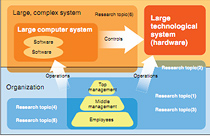 http://lab.sdm.keio.ac.jp/takano/index.html (Japanese only)
http://lab.sdm.keio.ac.jp/takano/index.html (Japanese only)
Applying risk management and safety culture in huge and complex plant systems
(1) Accident prevention (Organizational aspects, culture, human factors)
(2) Motivating workers and industries (Leadership, Communication)
(3) Emerging and creating in industries (Value sharing, HRM)
(4) Developing workers' competency (Creative mind, Emotion & Sensitivity)
Smart System Design Laboratory
(Former Aerospace and Intelligent Systems Laboratory)
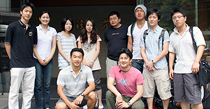 http://aislab.sdm.keio.ac.jp/en/
http://aislab.sdm.keio.ac.jp/en/
Maintaining research of interaction between physical space and virtual space as a foundation, this application will be extended widely from everyday life to outer space and aerospace. Research will be conducted with the perspective of contributing results to society and applying findings to business.
Research will cover topics such as: (1) An indoor GPS (IMES) that leverages artificial satellites; (2) Leading edge system engineering techniques for small satellites; (3) Upgrading investment information business leveraging artificial satellite data; and (4) Formal verification technology for socio-technical systems
Socio-Critical System (SCS) Laboratory
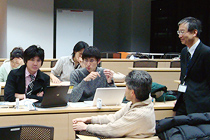 Socio-critical system intelligence and crisis management by applying Architecture Vee model
Socio-critical system intelligence and crisis management by applying Architecture Vee model
The Socio-Critical System Laboratory (SCS) focuses primarily on social systems, but takes a systems engineering approach rather than traditional social systems theory. Research themes cover a broad range of issues, from the pharmaceuticals industry to architecture and construction.
Symbiotic System Design Laboratory
 Creating an environmental and symbiotic society through new social and technical systems comprised of energy, agriculture, and vehicles by verifying multiple viewpoints.
Creating an environmental and symbiotic society through new social and technical systems comprised of energy, agriculture, and vehicles by verifying multiple viewpoints.
System Design Methodology Laboratory
This laboratory aims to explore common technological domains and methodologies among several application domains by developing new methodologies based on research on methodologies related to system design and management. Together with outside partners SDM faculty members evaluate new methodologies by applying them to various application domains.
Ubiquitous Communication Laboratory
 http://haruyama.sdm.keio.ac.jp/ubiquitous/ (Japanese only)
http://haruyama.sdm.keio.ac.jp/ubiquitous/ (Japanese only)
Communication system design for ubiquitous society
In a ubiquitous communication society, anyone can communicate with anyone anywhere. In order to realize such a society, the Ubiquitous Communication Laboratory is developing new technologies that integrate hardware, software, and communication technologies.
Visual Simulation Laboratory (VS-Lab)
 http://lab.sdm.keio.ac.jp/ogi/lab.html (Japanese only)
http://lab.sdm.keio.ac.jp/ogi/lab.html (Japanese only)
Visual Simulation, Visual Reality, Human Interface
Research to realize next generation information, communication, media system from the broader viewpoints of system design.
AGRI (Agricultural) Laboratory
 http://lab.sdm.keio.ac.jp/nouto_lab/ (Japanese only)
http://lab.sdm.keio.ac.jp/nouto_lab/ (Japanese only)
Execution of research, dissemination, and awareness activities relevant to region revitalization through rural-urban symbiosis
(1) Research about region revitalization by rural-urban symbiosis
- AGRI-semi held by Keio University Graduate School of System Design and Management
(Besides seminars on campus, there are also agriculture observation tours, training, field research, etc. in Hokkaido)
(2) Execution of forums etc. regarding region revitalization by rural-urban symbiosis
- Forum held through collaboration between Keio University Graduate School of System Design and Management and "Notokyosei Kenkyukai" (Research Committee on Rural-Urban Symbiosis) (12/1/08)
Notokyosei Kenkyukai (representative: Mikako Hayashi) is a civic group that promotes rural-urban symbiosis
(3) Activities to spread awareness and promote rural-urban symbiosis: report and book publications, media appearances, etc.
- "Nouson ni Dekakeyo (Going out to the farm villages)" by Mikako Hayashi (publisher: Jurosha; 1050 yen) released in June 2009
- Professors Maeno and Hayashi appeared on the radio program "Agriculture Island" (FM Hokkaido, 9/11/09)
(4) Miscellaneous: Farming experience and joint research at Keio SDM-contracted farms in Yuni-cho and Takikawa in Hokkaido.
Architecting Laboratory
 The Architecting Lab is a cross-disciplinary laboratory that investigates "architecting" as a methodology for creating system structures through literature research and original research. The methodology of architecting is used in both technology systems and social systems. By developing a theory out of the common ideas of architecting, we have a tool that can be used for the architecting of a wide range of systems. We also try to implement architecture by applying these tools.
The Architecting Lab is a cross-disciplinary laboratory that investigates "architecting" as a methodology for creating system structures through literature research and original research. The methodology of architecting is used in both technology systems and social systems. By developing a theory out of the common ideas of architecting, we have a tool that can be used for the architecting of a wide range of systems. We also try to implement architecture by applying these tools.
Human Dynamics Laboratory
This laboratory aims to theoretically prove and spread empirically-derived methodologies for musculoskeletal strain reformation. In particular, research topics include scientific analysis on data accumulated in reformation clinics in Canada, construction of human body model using mechanical engineering approaches, identification of fundamental body movement and stratification of motion group, and verification of movement using power saving measure.
Information Systems Perspective Investigation and Requirement Engineering Laboratory (INSPIRE Lab)
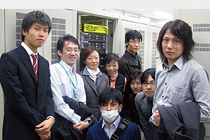 The INSPIRE Lab conducts multifaceted research on information systems, looking not just at software engineering but also at the hardware aspects and how systems are used. Main research activities
The INSPIRE Lab conducts multifaceted research on information systems, looking not just at software engineering but also at the hardware aspects and how systems are used. Main research activities
(1) Model driven requirements development
Research in this field aims to develop techniques and technologies to bring to information systems the same framework for safe, stable systems engineering that has been established in the course of large-scale, complex systems development projects. Of particular interest are efficient CONOPS creation and requirements definition and the application of traceability to systems requirements, systems architecture, and validation and verification tests. We also look at increasingly complex systems architecture and research in this area attempting to satisfy requirements in a way that is optimized to resolve conflicting viewpoints.
(2) Information architecture and information system architecture
Information architecture was developed in Europe as a methodology to take mere data and share it as something valuable. Our goal is to extend these concepts to the design of information systems.
(3) Human error and information system problems
The INSPIRE Lab uses member aptitude testing, quantification of individual mission objectives, and coaching as strategies to reduce system failures due to human error.
(4) Application to real-world systems
To date, three of our projects have made it into real systems.
- Semantic search engines
- Laboratory automation
- Integrated query system for cultural artifact archives
Local Resource Utilization Laboratory (LRU-Lab)
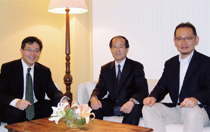 Some local municipalities have rich resources (including personnel), yet are not leveraging them to their full potential. We research methods on how to achieve autonomy in local regions while making effective use and application of those resources. By applying methods similar to business valuation to municipalities, quantifying the future value of resources with indicators such as discount cash flow, and rendering those on a balance sheet, we will assess the value of those regions and develop future visions that leverage their unique characteristics.
Some local municipalities have rich resources (including personnel), yet are not leveraging them to their full potential. We research methods on how to achieve autonomy in local regions while making effective use and application of those resources. By applying methods similar to business valuation to municipalities, quantifying the future value of resources with indicators such as discount cash flow, and rendering those on a balance sheet, we will assess the value of those regions and develop future visions that leverage their unique characteristics.
Mobility Systems Management Center
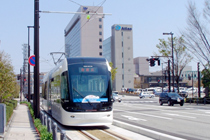 This laboratory conducts researches to solve various problems in mobility systems composed of various public transportation modes such as bus and train, automobiles, motor bikes and personal mobility, bicycles, pedestrians and wheel chairs and manage the systems.
This laboratory conducts researches to solve various problems in mobility systems composed of various public transportation modes such as bus and train, automobiles, motor bikes and personal mobility, bicycles, pedestrians and wheel chairs and manage the systems.
In particular, this cross-disciplinary laboratory plays a role of the hub to collaborate with Control Systems Design and Dynamics laboratory, Model-Driven System Development Laboratory, Universal Design Laboratory, and outside organizations and activities contributing to public transportation.
Model-Driven System Development Laboratory (MDSD-Lab)
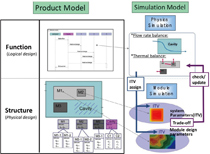 We will properly determine what is required by the system and conduct research to execute innovative system development efficiently and systematically. We will also research methodology for developing systems by integrating mechanical design, electronic design, software design, and system design in systems with increasing complexity. Specifically, our research activities include:
We will properly determine what is required by the system and conduct research to execute innovative system development efficiently and systematically. We will also research methodology for developing systems by integrating mechanical design, electronic design, software design, and system design in systems with increasing complexity. Specifically, our research activities include:
(1) System development of small satellites
(2) System development of next-generation mobility
(3) System development that eliminates task regression
Next Generation Contents Laboratory
Research topics
(1) Future of animation industry
(2) 3D Live broadcasting (concert, sports, etc.)
(3) Broadcasting of high definition images of local horse races
(4) Cooperation with Graduate School of Keio Media Design, recording and broadcasting total solar eclipse.
Science and Technology System Laboratory
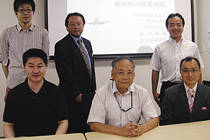 http://lab.sdm.keio.ac.jp/hibiya/
http://lab.sdm.keio.ac.jp/hibiya/
Research topics
(1) Thermo physical property measurements under collaboration
(2) Study on Motivation - Keyword for research and development
(3) Symbiosis of internet data center and agriculture
(4) Semiconductor chip foundry business
(5) Simulation study on emergency call of ambulance
(6) Study on publication system in Edo-era from the viewpoint of system engineering
Semiconductor Technology Laboratory
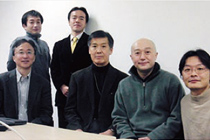 Concept of semiconductor is hard to capture because every component such as material, process, chip, system and software has individually developed profoundly. This laboratory aims to capture and organize semiconductor system technologies from system engineering perspectives.
Concept of semiconductor is hard to capture because every component such as material, process, chip, system and software has individually developed profoundly. This laboratory aims to capture and organize semiconductor system technologies from system engineering perspectives.
Social Design Center
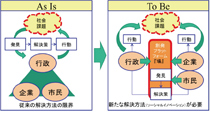 http://lab.sdm.keio.ac.jp/sdc/ (Japanese only)
http://lab.sdm.keio.ac.jp/sdc/ (Japanese only)
As laboratories at the SDM Research Institute undertake research, a center will be established as a base to conduct activities for those results and experiments.
The Social Design Center aims to become a sustainable base for the social activities of NPOs, regional activities, and social companies. Specifically, with a core of "practice," it will serve as a base for socializing research results such as by conducting business incubation and by collaborating with research institutes, other universities, the public and private sector, regions, etc. Not only will communicating the Center's social activities serve as PR, the Center could become a base for SDM alumni activities (other than education and research). We will also formulate a concept and prepare for establishment of the Keio Design Research Institution (tentative naming) that goes beyond graduate school.
Social Life System Laboratory
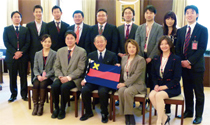 Research topic
Research topic
Design and formulation of next generation medical care and pharmaceutical systems by solving current medical care and pharmaceutical issues, designing new sustainable systems, and assessing usability.
Strategic Social Education System Laboratory
 http://lab.sdm.keio.ac.jp/sses/index.html (Japanese only)
http://lab.sdm.keio.ac.jp/sses/index.html (Japanese only)
Recent new graduate recruiting is not working well. Students fuss around by job hunting activities arranged by recruiting companies. Companies felt restlessly urged to recruit new graduates. Universities cannot provide sufficient education to students. This results in deteriorating impact and dynamism of Japan's industries. The Strategic Social Education System Laboratory (SSES Lab) was established to create win-win-win recruiting style for students, universities, and companies and a training program for people who can contribute to society from a young age.
Strategic Systems Design Laboratory
 A Small Melting Pot
A Small Melting Pot
Delightful systems are designed by our mixed team; across age, specialty and culture. Our purpose is to satisfy user needs by clear-cut requirement analysis and simple system design. We pay attention to the forest for the trees of a system.
Train Services Laboratory
 This laboratory proposes various ideas from users' perspectives regarding future train transportation services based on researches on technological, social, and psychological aspects SDM has been doing a joint research on a high-speed communication with Railway Technical Research Institute of JR since 2007 and succeeded in of about one gigabit per second between the moving Shinkansen bullet train body and the ground in 2010. This laboratory discusses new services which can be offered in trains when advanced IT such as high-speed communication technologies become available.
This laboratory proposes various ideas from users' perspectives regarding future train transportation services based on researches on technological, social, and psychological aspects SDM has been doing a joint research on a high-speed communication with Railway Technical Research Institute of JR since 2007 and succeeded in of about one gigabit per second between the moving Shinkansen bullet train body and the ground in 2010. This laboratory discusses new services which can be offered in trains when advanced IT such as high-speed communication technologies become available.
- Haruyama
- Teraoka (Faculty of Science and Technology)
Universal Design Laboratory (UD-Lab)
 We conduct research activities to provide accessibility to all by applying universal designs to various things that benefit from design.
We conduct research activities to provide accessibility to all by applying universal designs to various things that benefit from design.
(1) Accessible spaces and universal designs for mobility systems
(2) System designs for accessible movie theaters
(3) Universal designs for textbooks
VERSTA Laboratory
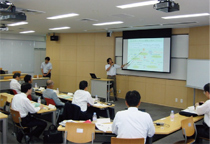 http://www.versta.org/
http://www.versta.org/
An NPO, VERSTA is established to provide technical and funding help to penetrate agroforestry in the Amazon region. This laboratory aims to propose new NPO operation schemes using system design approach.
Visible Light Communication Laboratory
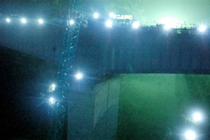 (1) Trend survey of international standardization of visible light communication technology
(1) Trend survey of international standardization of visible light communication technology
We will attend IEEE802.15 and IrDA meetings that are working to standardize visible light communication technology and research its direction. We will specifically attend the following meetings and also conduct a seminar in collaboration with IrDA and VLCC during CEATEC Japan 2009 (comprehensive exhibition of leading edge IT / electronics) at Makuhari Messe (Japan).
(2) Extraction of issues for executing interconnection verification tests relevant to visible light communication technology
We will design and review interconnection verification test structures (conformance tests and interoperability tests).
VSE Center in Japan
http://www.vse.jp/ (Japanese only)
VSE Center is established in order to strengthen global competitiveness of IT companies by promoting business process improvement focusing on system development of Very Small Entities using ISO/IEC29110. Establishment of continuous process improvement in system development is achievable by efficient process diagnosis using limited resources. VSE centers are established in European countries such as France, Belgium, Finland, Ireland, and Canada, Thailand, Columbia. As the base in Japan, this center will collaborate with these overseas VSE centers.
- Supervising Professors
- MAENO, Takashi
- HARUYAMA, Shinichiro
- KOHTAKE, Naohiko
- NAKANO, Masaru
- NISHIMURA, Hidekazu
- OGI, Tetsuro
- SHIRASAKA, Seiko
- TAKANO, Kenichi
- TANIGUCHI, Tomohiko
- TOMA, Tetsuya
- Guest/Project Professors & Lecturers
- OHKAMI, Yoshiaki
- HIBIYA, Taketoshi
- HAYASHI, Mikako
- YASUI, Toshiyuki
- YOSHIDA, Atsuo
- YANO, Hajime
- MATSUZAKI, Hisazumi
- ISHIBASHI, Kanenori
